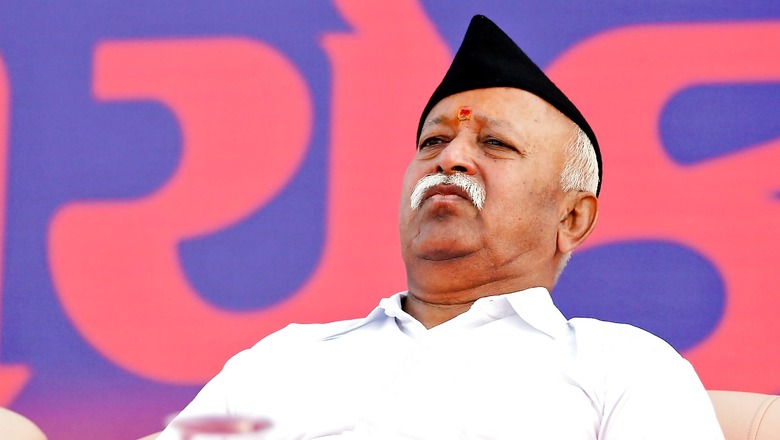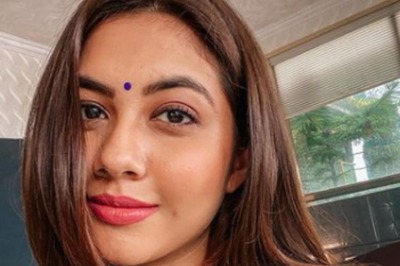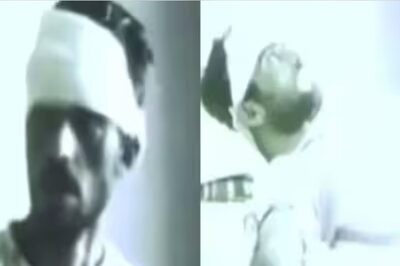
views
Mohan Bhagwat’s statement on the Gyanvapi controversy and Congress’ stand on Rajiv Gandhi’s killer walking free are two perfect examples of what went right for the Bharatiya Janata Party and what went wrong for the Congress in the political map of India with the former and its allies now ruling 17 states.
Bhagwat’s message why to escalate the fight and look for a Shivling in every mosque clearly tells of a practical assessment of the current socio-political situation of the country and its international diplomatic concerns. Muslims forms a large segment of India’s population, and for the country and every community to grow, we need the middle or neutral path. Also, to rule India, the world’s third largest globally connected economy and to achieve the $5 trillion dreams, the government needs to follow the path of peace and development where other countries would like to invest and find a market in.
RSS is seen as BJP’s parent organisation and the Hindutva-oriented nationalist stand is considered its core ideology. Yet the outfit, for many years, has been taking a calculated approach when it comes to religious matters of the country, something that now reflects in RSS chief Mohan Bhagwat’s words.
The gist of Bhagwat’s comment on Gyanvapi says, “Islam came to India with invaders. Temples were destroyed to hurt the morale seeking freedom. We can’t change history, created neither by today’s Hindus or Muslims. Why (are we) escalating fight today. Why to try finding a Shivling in every mosque. The Gyanvapi issue can be solved by having a discussion or by a court verdict. No more Andolan.”
Bhagwat’s current stand on the religious situation of the country is completely different from previous RSS chiefs.
KB Hedgewar, who founded the RSS in 1925 on the Vijaya Dashmi, advocated for a Hindu Rashtra. He said Hindutva was a Rashtriyata and Hindus formed Bharat, according to ‘Keshav Sangh Nirmata’, a biography by CP Bhishikar on Hedgewar. He said Indian Muslims considered themselves Muslims first and Indians secondarily. They withdrew from the allied efforts needed for Independence after the Khilafat movement saw a sudden death.
MS Golwalkar, who was the RSS chief from 1940 to 1973, wrote in the book — ‘We or Our Nationhood Defined’ — “The foreign races in Hindusthan must either adopt the Hindu culture and language, must learn to respect and hold in reverence Hindu religion, must entertain no idea but those of the glorification of the Hindu race and culture, i.e., of the Hindu nation and must loose (sic) their separate existence to merge in the Hindu race, or may stay in the country, wholly subordinated to the Hindu Nation, claiming nothing, deserving no privileges, far less any preferential treatment — not even citizen’s rights.”
But post Emergency, the RSS started taking an evolved approach. Balasaheb Deoras, the RSS chief from 1973 to 1993, said the definition of ‘Hindu’ was not limited to any particular kind of faith. He wanted the Sangh to take the political plunge something Golwalkar was not in favour of and Mr Deoras, in fact, left the organisation for eight years over it. He said that the Sangh should open its doors for other community members like Islam and Christianity. RSS insider Sajeev Kelkar writes in his book — ‘The Lost Years of RSS’ — “Within a few years of his return to the organisation after nearly eight years’ break, Deoras sought to convert the ‘eternal walker psyche’ which he detested and denied in 1965, to the achiever creed.”
This approach, with the BJP ruling the country since 2014 with an absolute majority has, in fact, now become a line in the RSS ideology as Mohan Bhagwat’s words suggest. And the BJP has tried to extend it politically.
Just a week ago, BJP President JP Nadda remarked that the Gyanvapi issue will be decided by the court only and as per the Constitution of India. When asked about BJP’s stand on Gyanvapi and Krishna Janmabhoomi in Mathura, Nadda clarified that the Ram Janmabhoomi decision was the only resolution the party had.
Now, contrast this to the stand taken by the Indian National Congress on Rajiv Gandhi’s assassination case.
Rahul Gandhi, Rajiv’s son, said in March 2018 that he and Priyanka had ‘completely forgiven Rajiv’s killers’. This was an extension to what they had said in 2008 when Priyanka had gone to Vellore jail to meet Nalini Sriharan.
After the meeting, Priyanka said, “It was my way of coming to peace with the violence and loss that I have experienced. I do not believe in anger, hatred and violence and I refuse to allow it any power over my life. Meeting with Nalini was my way of coming to peace with the violence and loss that I have experienced.”
Rahul Gandhi supported her stand, “I have a different way of looking at these things. I don’t have a problem either. We don’t carry hatred; we don’t carry anger. It’s not an exercise. She felt that she wanted to go and see the person. She has been feeling it for some time.”
In fact, before Rahul and Priyanka, Sonia Gandhi, Rajiv’s wife, had also showed similar forgiving nature. On her appeal, Nalini’s death sentence was remitted to life sentence in 2000.
Forgiving your father’s killers — that, indeed, was a difficult way to finding peace in your life on an issue that has haunted you for years. It was a call that they felt inside and went with it. It was indeed great because most of us cannot do such things and cannot even think about it and so this stand should have been respected. Priyanka had said in 2008, “It was a very personal visit and completely on my own individual initiative. I would be deeply grateful if this could be respected.” Also, Nalini’s daughter was the reason behind Sonia Gandhi’s appeal for clemency for her.
But the Congress, the Grand Old Party of India, forgot to follow this grand old wisdom. Though Rajiv’s family had forgiven his killers, the party reacted saying it was in deep pain and disappointment when one of the convicts AG Perarivalan was released by the Supreme Court after being 31 years in jail.
They tried to play politics over it and blamed the Narendra Modi government’s inaction, that according to them, was the reason behind the Supreme Court’s decision, conveniently forgetting the fact they are in alliance with the DMK, the ruling party of Tamil Nadu, which is advocating the release of six other convicts including Nalini. DMK President and Tamil Nadu chief minister MK Stalin, in fact, met, hugged and welcomed Pararivalan. But, according to the senior Congress leader and Trichy Lok Sabha member Su Thirunavukkarasar, there was no crisis and with the DMK, it was just a difference of opinion and the Congress-DMK alliance would continue.
So, the stand taken by the Congress looks more like a hypocrisy, particularly, when the DMK allotted one Rajya Sabha seat for the Congress in the elections.
This very stand tells how directionless the Congress has become. There is a continuous power struggle between the old guard and the new guard with many young leaders leaving the party. Many senior party leaders demand elections in the party but the Congress, it seems, is satisfied with an interim president for the past three years. Many senior leaders want a non-Gandhi to head the party but it is still ruled by the Gandhi family only. Calling itself a staunch secularist, the party is alleged to follow soft Hindutva approach to counter BJP’s Hindutva-oriented nationalist politics, even if it has only resulted in its electoral fall. And it clearly shows in the political map of India.
The year 2014 saw a historical low for the Congress in the Lok Sabha elections. It won just 44 seats. Upcoming years could be of revival but in place of rewinding its political fortunes, the party’s performance further went down.
After the 2014 Lok Sabha election results in May 2014, the Congress and its allies had formed the government in 13 states across the country. The Congress, on its own, was the ruling party in nine states – Karnataka, Haryana, Himachal Pradesh, Uttarakhand, Assam, Arunachal Pradesh, Meghalaya, Manipur and Mizoram. Today, it is limited to just four states along with its allies. While Rajasthan and Chhattisgarh has Congress governments, it is a junior partner in Maharashtra and Jharkhand.
Read all the Latest Opinions here




















Comments
0 comment